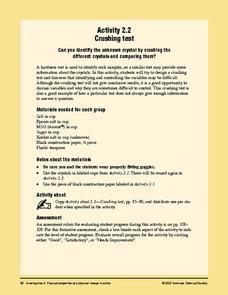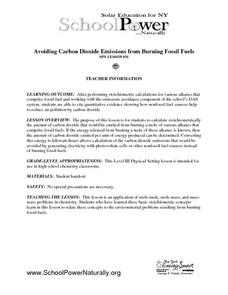Curated OER
Matter
In this matter worksheet, students are given 10 sentences with italicized terms that are wrong. Students correct the terms to appropriately fit the sentences. Topics are related to matter such as physical and chemical properties, solids,...
Curated OER
Effects Of Weathering
Third graders simulate weathering and erosion using sand and soil. They define weathering and the ways in which surfaces become weathered. Working as a class, 3rd graders complete various activities that demonstrate physical and...
Curated OER
Factors Affecting Plant Growth
Students determine the physical and chemical factors that affect plant growth. In this biology lesson, students explain the role of hormones in plants. They investigate how competition with other plants affect their growth.
Curated OER
Time For A Change: Illustrated Plates
Students create illustrated plastic plate designs depicting a physical, chemical, or biological change of some kind after investigating the artwork of porcelain artist Kataro Shirayamadani.
Curated OER
pH Potential
Students experiment to determine the positive and negative impacts of human activities on environmental change. They examine how physical and biological processes such as decomposition affect soil characteristics while looking at the pH...
Curated OER
Where's the Evidence?
Eighth graders observe evidence of chemical reactions. In this chemical reactions lesson students study chemical processes and complete a lab activity.
Curated OER
Puberty
Introduce the topic of puberty. This presentation breaks it down into bite-sized pieces: physical changes, mental changes, emotional changes, and social changes. There is some basic information in each section, which hopefully opens it...
Curated OER
That's Predictable - Stream Side Science
Research the impact that changes in biotic or abiotic factors might have on an ecosystem. Debate for or against the changes and take action in the community. This resource ideally follows stream studies that young ecologists may have...
Curated OER
Weathering and Soil Formation
A set of 27 slides systematically shows how weathering, erosion, and deposition contribute to soil formation. Both chemical and mechanical weathering are described, as are resulting soil layers and properties. There is no longer any need...
Cornell University
Thin Films
Combine mathematics and science to calculate measurements of unmeasurable materials. Individuals use knowledge of density and volume to determine the thickness of the film used in production. They also apply stoichiometry to determine...
Curated OER
Towers of the Lost City
Middle school marine scientists compare the pH change in distilled and saltwater as acetic acid is added one drop at a time. Then they compare the pH change in both when sodium hydroxide is added. This experiment demonstrates the...
American Chemical Society
Crushing Test
Solidify understanding of the properties of crystals by crushing them to compare hardness. After some class discussion, a procedure is planned, and then small groups go about making observations as they crush five different crystal...
NOAA
Please Pass the Salt
Salinity is the focus of two experimenters that work to answer the question, How does salt change the physical properties of water? Super scientists compare the freezing rate of salt and fresh water, combine the two waters to observe how...
Curated OER
Avoiding Carbon Dioxide Emissions from Burning Fossil Fuels
Chemistry and earth science meet in a lesson plan on carbon dioxide emissions. After reading about atmospheric problems caused by using fossil fuels, science stars balance equations for the burning of different alkanes. They compute the...
Curated OER
Power Play
Once your physical science stars have a grasp of the different forms of energy, use this resource to get them putting the energy to work. Small groups choose from seven different project options and work together to build an energy...
Chymist
Landfills and Recycling
Examine the nature of landfills through experimentation. Scholars build miniature landfills and monitor changes over a six-week period. Observations allow individuals to draw conclusions about the different types of trash and their...
Curated OER
Ammonium Nitrate - Heat of Solution
Students quantify the relationship between temperature, energy and heat
and define an endothermic reaction. They measure the energy change caused by dissolving one mole of ammonium nitrate in water.
Curated OER
Changing How Things Look
Third graders use a literature study in order to investigate how organisms effect an ecosystem. They are asked questions about change taken from the book. Students also take a nature walk to make field observations.
Curated OER
Weathering Experiments: sugar cubes, steel wool and gravel!!
Students study the chemical and physical weathering of "rocks". In this weathering experiments lesson students complete a lab that demonstrates how rocks weather.
Curated OER
Outcomes Science 4: Earth & Beyond
In this earth and beyond science worksheet, students read through 11 pages of information on weather, global warming, climate change and other related topics. There are many website links on the pages that provide additional information...
Curated OER
One for the Money
Eighth graders sort items as they are shown one at a time by the teacher. They attempt to identify the one physical trait the teacher is looking for (metal and not metal). After several objects have been shown and placed in groups, the...
Curated OER
It's in the Bag!
Eighth graders measure temperature changes and make drawings of the interactions between matter and energy. By measuring the temperature students can conclude if there are changes in levels of energy.
.
Curated OER
Chapter 16, Food Biotechnology
Although the points given on these slides are valid, the visual accessibility is poor. Consequently, many viewers would be distracted or entirely unable to view the presentation. The content is a review of microorganisms and their...
Curated OER
Wavelengths of Light
Explore physical science by participating in a visual spectrum experiments. Budding scientists identify the colors in the color spectrum and view the colors in class by utilizing cellophane, flash lights, and other arts and crafts...

























